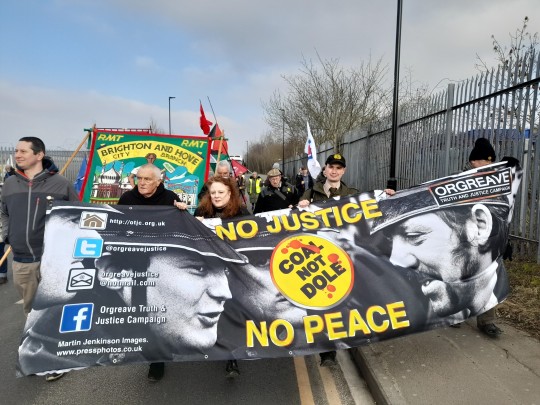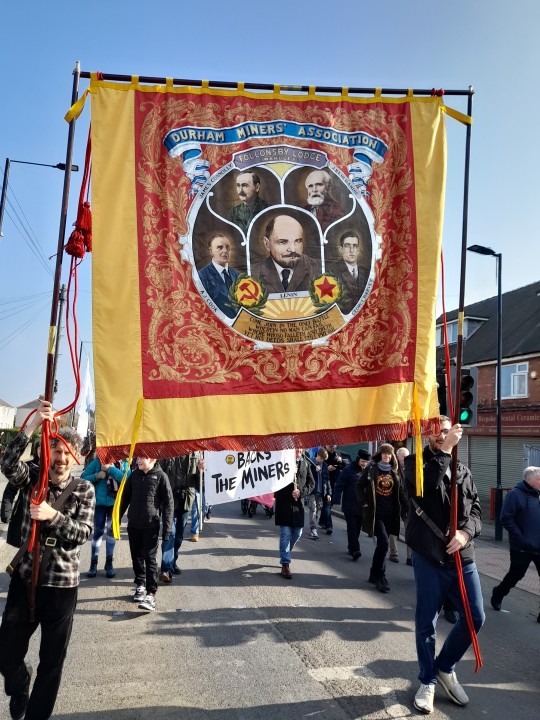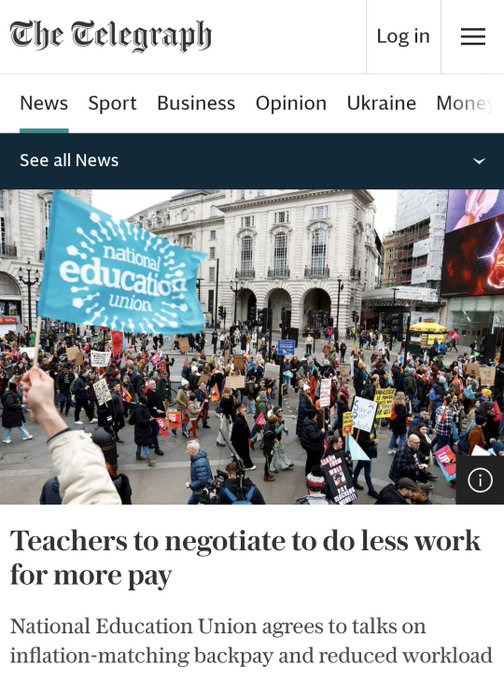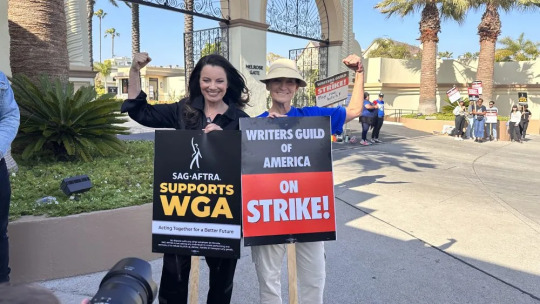#trade union strike
Video
Every Worker!
#tiktok#trade union strike#trade union#trade unions#workers rights#workers vs capital#union workers#working class#working class history#mike lynch#UK#workers of the world unite#capital vs labor#skilled labor#labor vs capital#labor rights#labor movement#labor movements#labor
169 notes
·
View notes
Text

9K notes
·
View notes
Note
Looking at the WGA Strike, I have a question. What exactly is preventing the major studios from just hiring new writers and just leaving the old writers out in the cold? Yeah, there will be writers that will be turned off on working for the corporations due to the strike, but I am sure there are plenty of writers who are too eager to get their foot in the door to care about that.
Scabbing is a phenomenon that happens in almost all strikes, but the problem with "getting your foot in the door" is that if you scab, you will be permanently blacklisted from union membership and all future union work. Which makes it profoundly counter-productive as a career move.
So. Don't. Cross. The. Picket. Line.
2K notes
·
View notes
Link
The restaurant industry has long coordinated efforts to suppress labor costs through the NRA, a multimillion-dollar lobbying machine funded both by its restaurant members and by the fees workers pay for required food-safety classes, according to a recent New York Times report.
The group has spent its war chest on lobbying campaigns to preserve a subminimum wage for tipped workers — who are disproportionately young, women, and people of color, and far more likely to live in poverty than regular minimum wage workers — and to help block state and federal sick leave proposals and minimum wage increases.
But now, restaurant executives are on edge. Union campaigns are suddenly penetrating their industry, which employs about 10 percent of the American workforce and has one of the lowest unionization rates of any sector. Over the past few years, baristas have unionized nearly 280 Starbucks stores in the face of enormous odds, and dozens of other coffee shops and restaurants have followed suit.
[...]
“The New York Times, The Wall Street Journal, every newspaper reports on every union win… when an unfair labor practice charge is filed, when there are challenges to elections,” said Felice Ekelman, a principal at Jackson Lewis, one of the oldest and most infamous union avoidance law firms in the country. “When did this become first page news?”
“And guess who’s reading it?” replied Laura Pierson-Scheinberg, one of Ekelman’s Jackson Lewis colleagues, as the two sat across from each other on the main stage of the summit. “My kids. Literally. I have an 18-year-old, my kids are into it.”
The two lawyers were discussing a new threat for the restaurant industry: the unexpected rise of union campaigns in workplaces that, for decades, have largely been immune from such organizing efforts.
[...]
“Before, I used to say… ‘[Unionization] isn’t a problem for you in the restaurant industry,’” said Pierson-Scheinberg. But now, she warned, “Kids do not care about paying union dues. Two percent of pay, are you kidding me? Their Netflix costs more. They think it’s a hell of a deal.”
The “kids,” she added, are organizing workplaces which would have previously seemed unreachable.
3K notes
·
View notes
Text

The UK in 2023 … like to charge, reblog to cast.
3K notes
·
View notes
Text
reminder to support your local strikes.
whether that be by joining picket lines, donating to strike funds, or just spreading awareness of any industrial action that's going on, any assistance helps.
don't listen to the anti-union rhetoric being pushed by the right, both in and out of government. the reason it's become so prevalent in recent years is that the establishment is so afraid of losing out on even the smallest amount of profit, that they'll do anything they can to suppress it.
#socialism#communism#marxism#anarchism#socialist#leftist#leftism#communist#left wing#ancom#anarcho communism#anarchocommunism#queer anarchism#queer liberation#strikes#trade unionism#unionize#trade unions
4K notes
·
View notes
Text




Miners Strike memorial march at Hatfield Main today
256 notes
·
View notes
Note
I had a random gut feeling that if writer and actor strikes in USA continues, capitalists may start using their pundits to incite fascists to go after the protesters. Your opinion on this perspective?
We don't know about that Anon, that seems a bit far-fetched. It's not like fascists have a 100+ year history of attacking strikers and trade unions. Unless of course you count Benito Mussolini hiring out his blackshirts as strikebreakers in 1919. Or the fascist attacks & disruptions of the 1926 general strike in the UK. Or Hitler making trade unions illegal in 1933 and then sending trade unionists to be murdered in concentration camps.
Anyways, that's all ancient history and there are no examples of recent fascist activity targeting trade unions. Aside from the fascist attack on striking railway workers in Manchester in 2019. Or the murder of Bolivian miner union leader Orlando Gutiérrez in 2020 by a mob of fascists protesting the outcome of the country's election by beating him to death. Or the 2021 attack on the headquarters of an Australian construction workers' union in Australia in 2021 by far-right extremists and anti-public health conspiracy theorists, who broke into the building and attacked union officials and union staff. Or the attack by members of the fascist Forza Nuova party on a union office in Rome, Italy that same year. Or the (failed) attempt by fascists in Albi, France to assault trade union members (only to be badly beaten themselves by the union members!) in October 2021. Or the November 2021 attack on two union members in Paris by a fascist gang.
Well anyways it's not like fascist leaders like the UK's Alek Yerbury are currently calling for his followers to target union offices, picket lines, and strikers.
You see? Nothing at all to worry about and anti-fascists shouldn't bother showing their support and solidarity with working people striking in an attempt to raise the working conditions and lives of all of us! OR MAYBE WE SHOULD???
709 notes
·
View notes
Text

The telegraph wants us to be outraged that a union is functioning as intended?
923 notes
·
View notes
Text
While I cannot speak for all schools I can tell you what’s going on at the one I work in.
The school is down 2 science teachers and have been since September, no one is applying for the job.
Several members of staff have been off with mental health issues for months due to how stressful everything is.
Two head of departments have handed in their resignations
Two maths teachers have handed their resignations in
3 Teaching assistants have quit
Loads of teachers have their resignations ready to be turned in but are reluctant to leave because they care about the kids.
SEN students aren’t getting their allocated 1-1 support hours due to a shortage of Teaching assistants
The science department can’t afford to do certain practicals
The art department can’t afford new equipment
Only certain classrooms can afford to be heated
Some children who aren’t registered Pupil premium are going hungry and some kind members of staff are buying their lunches for them out of their own pocket.
There’s a shortage of note books
The chairs keep breaking and there’s not enough money to replace them. ( students swinging on chairs over time breaks the back legs)
There’s no glue, the glue that’s left is kept inside offices or teachers desks
There’s no spare stationary, loads of teachers are buying stationary for kids out of their own pockets.
Kids behaviour is getting worse, teachers are battling tik tok and other forms of media for their attention and it’s exhausting.
Kids are starting to think rules don’t apply to them and refuse to come to lessons and are verbally abusive to each other and staff members
There’s been an increase in schools in my area of kids getting into fights and disrupting lessons
The school I work in isn’t even a ‘bad’ school, it’s one of the most applied to in the area which gets the some of the best GCSEs results in the county.
A lot of people are acting like only the “troubled schools” are being affected and it’s not. Every school is struggling which is why Teachers and support staff are protesting.
How can anyone run a school without the budget or the staff, the strikes aren’t affecting your kid’s education, the government is.
#education#uk education#teachers#learning#strikes#teacher strikes#students#uk politics#politics#government#schools#trade unions#t
514 notes
·
View notes
Text
On the picket line the other day, I saw a former lecturer of mine, and we got talking. Part of the whole dispute we in UCU are involved in is around the fact that Higher Education as a sector has over £40 billion in reserves nationwide, and many universities have chosen to dump that into vanity projects like shiny new buildings (many of which are both exorbitantly expensive and also not fit-for-purpose), rather than invest in staff during the biggest cost of living crisis in living memory.
My former lecturer, a staunch liberal, intimated that £40 billion seems like a lot, so who knows if that money even exists. So I told him, here’s what I do know: three years ago, my managers, who were responsible for allocating a £5 million bid of government funding, ignored the advice of me and another expert on practical teaching equipment, and chose instead to spend more on products from existing contracts. This could be seen as corruption, but technically I think it’s just laziness. But it also amounts to a mutual agreement among university management and external contractors and suppliers to continue to profit off government funds, rather than invest in staff.
Over the last ten years, workers across Higher Education are being paid 25% less in real terms, due to stagnating wages, due to inflation, due to increased cost of living. This is to say nothing of the fallout from covid, or the arguably substantial decline in education standards new students receive (in spite of all the money dumped into new buildings and equipment).
Meanwhile, my institution’s student intake has nearly doubled in the past five years, which both means greater workload and, in theory, greater revenue. But who sees that money? Not me, nor even the lecturers who make twice as much as me, but you can bet that money is going somewhere.
Initially we had no offer of increased pay, then we went on strike and got an offer of 3% (again, in the face of a loss of 25% over the last decade in real terms), and then 5%. These ‘offers’ have been overwhelmingly rejected by UCU members, in part because they prove that that money does exist, and is available for our employers to give us our due. But more importantly, this is not just about pay, and the problems of workloads, pensions, mismanagement, and discrimination, which sparked the current strikes, won’t be solved by throwing money at them.
Nevertheless, slowly but surely, we are making advances. Industrial action works. Support the Unions and support the strikes!
Solidarity forever.
#UCUrising#UCU#UK politics#strikes#strike action#industrial action#original#University & College Union#trade union#labour union#up the union!
518 notes
·
View notes
Video
Teamsters!
#tiktok#UPS#teamsters#union workers#labor unions#trade union strike#trade union#unions#labor vs capital#capital vs labor#labor rights#skilled labor#labor#labor movements#labor movement#workers vs capital#workers rights#essential workers#workers
106 notes
·
View notes
Text
i do feel we don’t do nicknames as well as we used to. millennials may indeed have killed the nickname industry. they just aren’t as good any more. aren’t as popular. you might get the odd shortening of a name, sure. your ellies. your mats. even your single initial nicknames. certain people only call me by my surname. but there’s no creativity in it anymore. it used to be an art. my mum has a friend that everyone calls chalky because his surname is white. my dad has a friend they still call sparky. he’s in his late fifties. can you imagine everyone committing to the bit like that nowadays? you try and get sparky to catch on nowadays. you seen the disdain you’re met with. people will just turn away from you. my mum and her best friend made up a meaningless nickname for my grandmother when they were children and that was the name her flowers spelt out at her funeral. what happened to that. nicknames just aren’t clever anymore. no one’s willing to put the work in. it’s like no one cares. head in my fucking hands.
#(ridi’s) bigmouth strikes again#no one commits to the bit there’s no sense of community any more. there is no collectivism. it takes collective effort to forge a nickname#people have to call you by it. that neighbourly community spirit is gone. the decline of nicknames as an industry to be held alongside the#destruction of the trade union movement as another crime of thatcherism perhaps.
80 notes
·
View notes
Note
Since SAG AFTRA has also gone on strike, does that mean the negotiations between the WGA and executives went poorly?
This is a great question, because it allows me to do some educating about labor law!
Today's topic: "bad faith" bargaining.

While often honored more in the breach than the observance, U.S labor law requires employers to engage in collective bargaining with unions, once those unions have been recognized as the "exclusive representative" of the workers via card check or union election.
Because Leon Keyserling and Senator Robert Wagner were not idiots and could see it coming that employers would drag out negotiations in order to try to destroy the union through attrition, the Wagner Act of 1935 required employers to not just negotiate with unions, but to negotiate "in good faith" and made it a violation of the law to negotiate in bad faith.
Two major forms of negotiating in bad faith are "dilatory tactics" (deliberately using the procedures of collective bargaining and labor law more generally to delay the process) and "surface bargaining" (where the employer goes through the motions of meeting with the union, but refuses to engage in substantive discussions). This can include stuff like sending representatives who don't have authority to negotiate, refusing to schedule sessions or trying to unilaterally control the timeline, not asking questions or engaging in back-and-forth discussion, refusing to discuss topics that are germane to conditions of employment, and so forth.
These kinds of actions are considered Unfair Labor Practice violations and the NLRB can issue "cease and desist" orders and "affirmative bargaining" orders, as well as some rather creative "special remedies" that get around the Wagner Act's lack of monetary penalties. As that suggests, however, part of the problem is that because the Wagner Act doesn't have significant monetary penalties, a lot of companies will just budget a line item for breaking the law and treat that as the cost of doing business, while using the same dilatory tactics to appeal NLRB decisions through the courts in the hope that they can outlast the union. (This is why one of the most effective labor law reforms that could be passed in a Democratic Congress would be adding compounding daily monetary penalties and streamlining the ULP process in both the NLRB and the courts.)

From what I've read of the negotiations, I think there's a pretty clear cut case that AMPTP engaged in surface bargaining and used dilatory tactics, with the intent to run out the clock and thus provoke a strike in which they believed economic pressure would force the union into surrender, essentially a lock-out without declaring a lock-out.
I think it's backfired on them. A big part of AMPTP's strategy for winning that strike was to divide-and-rule - hence why they came to an agreement with the Director's Guild - by getting through the lean months by filming and releasing shows and movies with already-completed scripts. Now that SAG-AFTRA is on strike, that lifeline of content is immediately cut - which means AMPTP is going to run out of revenue in the near future, which as WGA leaders have pointed out means bad quarterly earnings reports, which means stock prices tank, which means investors and boards of directors get angry and executives become the ones facing the prospect of losing their jobs at the same time that all the compensation they've structured as stock options to avoid taxes loses value.
476 notes
·
View notes
Link
The workers at the BHX4 warehouse in Coventry walked out on Wednesday morning demanding to be paid £15 per hour.
Private security guards hired by Amazon were present in large numbers on the picket lines at both the walk-in and drive-in entrance. Stuart Richards, a senior organiser for GMB, said: “If you’re one of the workers who walked out in the middle of your shift, or if you’re a worker stood on the picket line surrounded by security guards, that’s a huge level of intimidation.”
Also present on the picket line were a number of police vans, as well as officers patrolling.
One worker, who chose to remain anonymous for fear of retribution, said: “Amazon customers should know the real story behind what’s happening in warehouses around the world. Amazon is trying to promote a fake image of associates being treated well. It’s not true. We’re treated as numbers under permanent stress. We can’t afford to get sick.”
[...]
Amazon has been repeatedly criticised for the working conditions at its fulfilment centres. There have been reports of timed toilet breaks and surveillance software that ruthlessly sets impossible performance rates. After the GMB revealed that ambulances had been called out to Amazon’s warehouses 1,000 times in five years, the online retailer cracked down, instructing workers to instead call a taxi or to drive the injured person to hospital.
[...]
Amazon has so far refused to engage directly with the GMB. Since the launch of the first ballot in September, Amazon has implemented a number of anti-union measures.
525 notes
·
View notes
Text
seeing a lot of discourse within the british media about these strikes, most notably the fact that several pundits and politicians are claiming that raising wages will "increase inflation".
to be completely blunt, this claim is absolute bullshit. wages haven't kept up with inflation since the 2007 financial crisis, and yet corporations (e.g. private rail companies) have reported record profits. so how the fuck is it acceptable for corporations to enjoy massive profits, but when workers demand pay rises to be able to afford to live, its somehow wrong?
and yes, i know strikes are disruptive, but that's kind of the fucking point. direct action, whether industrial or social only works when disruptive.
so yeah, support the strikes, support workers, and fuck the companies who refuse to pay them properly.
#socialism#marxism#communism#socialist#anarchism#leftist#leftism#communist#left wing#ancom#rmt strike#rmt union#trade unions#syndicalism#anarcho syndicalism#trade unionism#unionize#protest#industrial action#direct action#left unity#politics#ukpolitics#british politics#anti capitalism#anticapitalism#antiwar#right to protest#right to strike#rail strikes
919 notes
·
View notes